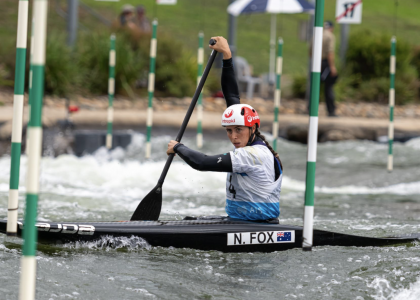Morocco and Senegal have potentially locked away canoe slalom quotas for this year’s Tokyo Olympic Games following a hectic final day of qualifying at the African qualifiers and Pyrenees Cup at La Seu in Spain.
Morocco secured berths in the men’s and women’s kayak, while Senegal picked up the quota for the men’s canoe. There was no quota awarded for the women’s canoe. Both countries need to formally accept the Tokyo positions.
21-year-old Moroccan Mathis Soudi finished an impressive second in the final of the men’s K1, while teammate, 32-year-old Celia Jodar, finished 19th in the women’s kayak event.
It’s the first time Morocco will have two athletes in canoe slalom since the sport made its Games debut in 1972.
Jean Bourhis, who finished 18th for Senegal in the men’s canoe at the 2016 Rio Olympics, gave himself the chance of competing at a second Olympics by finishing seventh in Sunday’s C1 final.
But it was an emotional final for 27-year-old Bourhis, with his 23-year-old brother, Yves, dislocating his shoulder shortly after the start of his run
Africa’s best ever performance at an Olympic Games came in 2008 in Beijing, when Benjamin Boukpeti won bronze for Togo in the men’s K1 final. It was Togo’s first ever Olympic medal. Boukpeti also competed at the 2004 and 2012 Olympic Games.
La Seu in Spain was the venue for the canoe slalom competition at the 1992 Barcelona Olympic Games, where South Africa’s Gary Wade made history by becoming the first ever African athlete to compete in an Olympic canoe slalom event.
There were no African canoe slalom athletes at the 1996, but the continent has been represented at every Games since Morocco’s Nizar Samlal competed in the K1 at the Sydney Olympics.
2016 Rio Olympic gold medalist, Maialen Chourraut, showed no ill effects from the long Covid lockdown with a stunning six-second victory in the women’s K1. 38-year-old Chourraut was the only female K1 athlete to complete the course without a penalty.
Spanish teammate Luis Fernandez celebrated his first major success by winning the men’s C1 final, while in the men’s K1 2016 Olympian Pavel Eigel of Russia emerged victorious, also producing a faultless run to take the gold.
Andorra’s Monica Doria Vilarrubla picked up six seconds of penalties in the women’s C1 final, but her raw speed was still quick enough to take the gold by 1.39 seconds ahead of Spain’s Ainhoa Lameiro.




